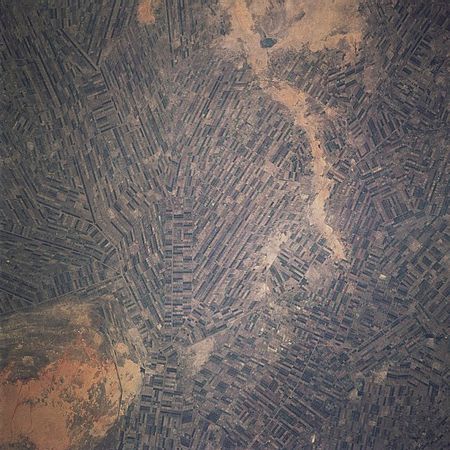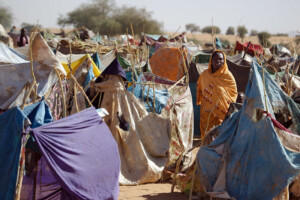Irrigation problems lead to meagre sorghum harvest in Sudan’s El Gezira

The irrigation canals of the El Gezira Scheme as seen from space, 1997 (Wikipedia)
The El Gezira and El Managil Farmers Alliance yesterday confirmed a significant decline in the production of sorghum this year. The main reason is reportedly the lack of sufficient irrigation caused by delayed maintenance.
Abdeen Bargawi, one of the Farmers Alliance’s leaders, told Radio Dabanga yesterday that the end of the current rain-fed agricultural season shows a large decrease in the production of sorghum, an important stable food crop in Sudan.
“The main reason for the decline is the lack of sufficient irrigation as the water canals have not been cleaned for years,” he explained. “The increased scarcity of irrigation water led quite some farmers to stop cultivating this season. Last year, the situation was bad already and many farmers sustained significant crop losses because of thirst. If they had been compensated, they would have been able to cultivate this year, but everything got messed up because of the war.”
At the start of this year’s agricultural season that began in June, the El Gezira Agricultural Scheme* management imposed an increase in cultivation fees, amounting to SDG25,000 per feddan (1.038 acre). “This large increase exceeds the price of a 100kg sack of sorghum. These days, a feddan produces 400 kilogrammes of sorghum.”
Bargawi said that protests of the alliance against the increased taxes prompted the acting governor of El Gezira to reverse the step and bring the fees down to the amount imposed last year, which amounted to SDG16,000 per feddan.
He further criticised the acting government’s decision to stop buying grain at the agreed prices, and also warned of the deteriorating conditions farmers have been facing in receiving hundreds of thousands of displaced people who fled the fighting between the Sudanese army and the Rapid Support Forces (RSF) in Khartoum that broke out in mid-April.
In February this year, farmers in the northern part of the El Gezira Scheme complained of an acute shortage of irrigation water. “After the failure of the summer season because of torrential rains and declined irrigation water services, our winter crops are now withering,” farmer Mohamed Gusheiri told Radio Dabanga.
Radio Dabanga reported in August that the war, poverty, and poor rainfall were endangering Sudan’s agricultural season.
The UN Children’s Fund (UNICEF) and the world Health Organization (WHO) have warned that further attacks on and disruptions of health and nutrition services in Sudan could cost over 10,000 young lives by the end of 2023. The UN Office for the Coordination of Humanitarian Affairs (OCHA) reported yesterday that at least 10,000 children under the age of five may die by the end of 2023 due to the increase in food insecurity.
* The El Gezira and El Managil Agricultural Scheme encompasses 150,000 feddans (156,000 acres). Most areas are irrigated with pumps. On average, 1,000 kilogrammes of sorghum used to be produced per feddan, but this slowly decreased due to mismanagement of the Scheme, alleged malpractices by Sudan’s Agricultural Bank, and sheer poverty.
The agricultural scheme used to be one of the world’s largest irrigation projects, yet has been prone to land grabbing and other malpractices in the past few decades. In late 2014, President Omar Al Bashir described the Scheme as “a burden on the country’s budget”. A year later, the Agriculture Ministry amended the El Gezira Scheme Act, to be able to transfer land ownership to private sector and foreign investors. That same year the Farmers Union was disbanded by the Al Bashir regime.











 and then
and then